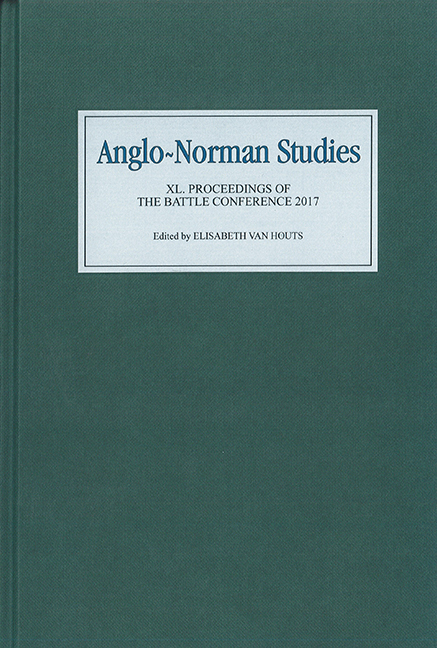Book contents
- Frontmatter
- Contents
- Illustrations and tables
- Editor's preface
- Abbreviations
- The R. Allen Brown Memorial Lecture, 2017
- The R. Allen Brown Memorial Lecture, 2016
- The Marjorie Chibnall Memorial Essay, 2017
- Becket vult: the Appropriation of St Thomas Becket's Image during the Canterbury Dispute, 1184–1200 (The Marjorie Chibnall Memorial Essay)
- La Bataille de Bouvines reconsiderée
- Abbot Peter the Venerable's Two Missions to England (1130 and 1155/1156)
- La production manuscrite anglo-normande et la Bible d'Herman de Valenciennes: usage et réception d'un livre vernaculaire (xii e–xiv e siècles)
- Ralph Niger and the Books of Kings
- From Captivity to Liberation: the Ideology and Practice of Franchise in Crusading France
- Daughter of Fulk, Glory of Brittany’: Countess Ermengarde of Brittany (c.1070–1147)
- The Idea of ‘Empire’ as Hegemonic Power under the Norman and Plantagenet Kings (1066–1204)
- Child Kingship and Notions of (Im)maturity in North-Western Europe, 1050–1262
- Note: A Micro-Economy of Salvation: Further Thoughts on the ‘Annuary’ of Robert of Torigni
La Bataille de Bouvines reconsiderée
from The Marjorie Chibnall Memorial Essay, 2017
Published online by Cambridge University Press: 17 July 2018
- Frontmatter
- Contents
- Illustrations and tables
- Editor's preface
- Abbreviations
- The R. Allen Brown Memorial Lecture, 2017
- The R. Allen Brown Memorial Lecture, 2016
- The Marjorie Chibnall Memorial Essay, 2017
- Becket vult: the Appropriation of St Thomas Becket's Image during the Canterbury Dispute, 1184–1200 (The Marjorie Chibnall Memorial Essay)
- La Bataille de Bouvines reconsiderée
- Abbot Peter the Venerable's Two Missions to England (1130 and 1155/1156)
- La production manuscrite anglo-normande et la Bible d'Herman de Valenciennes: usage et réception d'un livre vernaculaire (xii e–xiv e siècles)
- Ralph Niger and the Books of Kings
- From Captivity to Liberation: the Ideology and Practice of Franchise in Crusading France
- Daughter of Fulk, Glory of Brittany’: Countess Ermengarde of Brittany (c.1070–1147)
- The Idea of ‘Empire’ as Hegemonic Power under the Norman and Plantagenet Kings (1066–1204)
- Child Kingship and Notions of (Im)maturity in North-Western Europe, 1050–1262
- Note: A Micro-Economy of Salvation: Further Thoughts on the ‘Annuary’ of Robert of Torigni
Summary
The Battle of Bouvines is known in detail from the narratives of William le Breton but his reports are less objective than modern historians, let alone those in military studies, have generally thought them to be. William's accounts are infused with Capetian propaganda in the way they put King Philip Augustus at the centre of the battle. Here, constructive criticism is offered of that line of argument relying in particular on the report by the so-called Anonymous of Béthune. It is suggested that the scale of the battle should be reduced and a discussion of what was at stake and what the battle's impact was is set out along similar lines as has been done for other battles in the context of warfare and feudal relations.
Bouvines appears at the juncture of two types of operations. A true chivalric battle engaged the right flank of the French and Count Ferran's knights with its codes and scenes similar to those found in the Anglo-Norman world of Orderic Vitalis, such as the use of a knife, and not arrows, with which to kill horses, as in the games of the ‘poignées’. Further to the left, it was essential for the French to disperse the footsoldiers, who protected the mounted knights, and whose flight left the calvalry exposed. It is uncertain whether organised mercenaries took part in the battle of Bouvines. The defection by the duke of Louvain was an important reason for the defeat of Emperor Otto and the ‘men from Brabant’ who offered resistance to the last man standing – for which they were praised by many French commentators – and who were probably men who had come with the emperor.
Orderic Vital n'a pas relaté la bataille de Bouvines. Pareil oubli s'explique vraisemblablement par le fait qu'il est mort près de soixante-dix ans auparavant. Mais c'est bien regrettable car du coup nous ignorons s'il aurait été frappé, comme à Brémule, par le petit nombre de morts et s'il aurait laissé entrevoir là une des ces batailles partielles dont l'histoire de la conflictualité féodale est émaillée, et qui ne sont que des fractures exceptionnelles, vite réduites, de la société chevaleresque et chrétienne.
- Type
- Chapter
- Information
- Anglo-Norman Studies XLProceedings of the battle conference 2017, pp. 77 - 90Publisher: Boydell & BrewerPrint publication year: 2018



